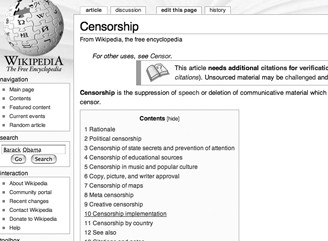The Neutrality of This Article Is Disputed
June 22, 2011

Published: April 9, 2009
I pride myself on having a wealth of useless knowledge and factoids, most of which I gather by wasting time pouring over Wikipedia pages. Wikipedia is perfect for the 21st-century Renaissance woman, who knows not a lot about any one particular thing, but a little about a lot of things. And even though I can’t cite Wikipedia on my research papers, I consider it a more-or-less reputable source. Wikipedia pages are carefully monitored to catch errors, and posters are required to back up the information they provide with sources, which are footnoted. If someone posts incorrect information, chances are it will have been corrected by the following day.
Imagine my disappointment when I stumbled across a World Net Daily article which pointed out that President Obama’s Wikipedia page was scrubbed clean of any mention of controversy—to the extent that it smelled of censorship. Obama’s campaign was certainly not free of controversy. There were questions about the authenticity of his citizenship and his relationship with the activist Bill Ayers and Rev. Jeremiah Wright, his former pastor. No mention of these controversies can be found on Obama’s Wikipedia page, however.
The WND article entitled “Wikipedia scrubs Obama eligibility” says that members who attempted to post about questions doubting Obama’s eligibility to run for president had their posts removed and experienced holds on their accounts. During his campaign, some controversy arose regarding Obama’s presidential eligibility due to questions about whether or not he was actually a natural-born citizen. The Supreme Court ignored these concerns and verified Obama’s eligibility by default. But that didn’t erase the controversy from history. This issue received significant news coverage and was a serious concern of many people. Why shouldn’t it be mentioned on Wikipedia, then, especially if the poster has, as is required, provided third-party sources to back up the post? There is no question that this controversy existed, and yet, as far as Wikipedia is concerned, it never did.
Obama’s relationship with activist Bill Ayers was often discussed throughout his campaign, yet the name “Bill Ayers” is not mentioned once on Obama’s Wikipedia page. Obama’s cocaine use is mentioned, but only in passing (as opposed to George W. Bush’s alcoholism, which is mentioned in his article at greater length). Though it is briefly stated that Wright is Obama’s former pastor, the page only states that Obama immediately left the church after Wright made some controversial statements. I seem to remember a great deal of press coverage questioning the extent of Obama’s relationship with Wright and doubts as to whether Obama really was unaware of Wright’s radical sentiments for 20 years. There is no mention of this press coverage or these public doubts.
Obama isn’t perfect, but you would think he was by reading his Wikipedia page. It resembles a glowing review more than an encyclopedia entry. You might argue that these are no longer hot debate topics or that everyone already knows about them anyway. But regardless of whether they are still “hot,” they happened and can’t just be erased from history.
I’m not sure who to blame for this disappointment. If Wikipedia is just trying to maintain a level of respect for the president of the United States, then I guess I should blame Wikipedia. This is America, and we don’t currently enforce any anti-sedition laws. It’s safe to discuss controversy. It is acceptable to criticize our political leaders and question their pasts and their credentials. This is all part of the beauty of America. Wikipedia, which I always thought to be so reflective of democracy—by the people and for the people—shouldn’t be pulling wool over the eyes of Americans. I’m not saying that Wikipedia should be a forum for discussion. But whether it’s about Obama or Bush, I want to be able to read the whole story—not just the flattering parts. I have always been a huge fan of Wikipedia, but this shady behavior has made me wary of its dependability. Who knows what else they’re hiding from us?








